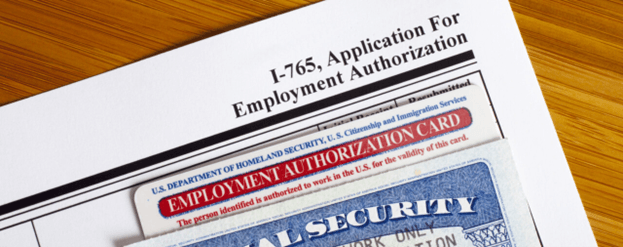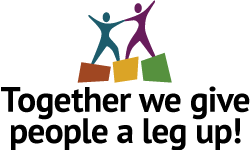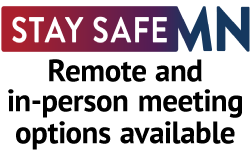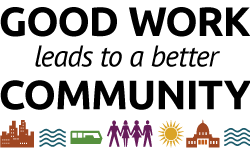
No matter under what circumstances someone leaves their home country, immigration is a complicated process that can take years to complete. One of the most important pieces of the immigration process is finding a job. Employment can open doors to meeting basic needs like housing and food security. Additionally, employers can provide sponsorship for being granted permanent residency (part of getting what’s known as a Green Card). There are a number of things most employers in the U.S. want that can be especially difficult for new immigrants: learning to speak English, meeting employers' standards of "reliable" transportation, and proving their credentials and experience are just a few. Employer bias, however, is not responsible for all the hurdles to employment that job seekers face; many of the required parts of the immigration process add unnecessary challenges to securing employment and settling into a new life. One of these pieces is work authorization documentation (formally known as employment authorization documents, or EADs).
The application for an EAD goes hand-in-hand with applying for certain types of visas– Green Card applicants, for example, can apply for work authorization as a part of their Green Card packet without paying extra fees– but the required annual or biennial renewals cost upwards of $400 each time they’re filed. In my experience as a case manager, the job seekers who are subjected to these costs are frequently among those who are least able to save a couple hundred dollars a year. Even setting aside these shocking costs, the renewal process can take several months, leaving immigrants at risk of losing their jobs or being deported for working without authorization. In an attempt to clear the millions-strong backlog of renewal applications, United States Citizenship and Immigration Services (USCIS) recently extended the time that immigrants can work past the expiration date of their EAD from 180 days to nearly a year and a half (if they applied for renewal before it expired).
Although this extension is great news for job seekers and employers alike, it begs the question— why do renewals take so long, especially when unemployment can be so damaging for people trying to find a home in the U.S.? Immigration advocacy groups have accused USCIS of dragging their heels in renewing EADs, and the American Immigration Council even sued USCIS in 2021 over the delays (though the case was dismissed, as USCIS renewed the plaintiffs’ EADs before it came to court). Although it’s comparatively rare, USCIS can choose to deny the renewal of an EAD; the sharp uptick in denials during the Trump presidency indicates that EAD renewal, like so many things that impact the immigration process, is tied to politics. Given that immigrants who work without an EAD can be deported and banned from re-entry to the U.S. for up to a decade, and that unemployment can be debilitating for psychological and physical well-being, employment authorization is serious business. The fact that political changes can have such devastating impacts on peoples’ lives is incredibly unjust.
A majority of our job seekers here at Daily Work are immigrants, many of whom have come to the U.S. in just the last few years. As they strive to find their footing in a new country, we give support and resources that can help job seekers navigate the stumbling blocks that can be raised by the immigration process. A crucial component of our work with job seekers is providing a compassionate space where we can put our heads together with theirs and navigate complex official documents together. For the last few weeks, I have been meeting with a job seeker who has been unable to work for a few years and is finally ready to reenter the workforce. Now that she has come to Daily Work, we can keep track of her EAD renewal date together and look into resources that might help her cover the steep filing costs of keeping her documents up to date. Case managers like myself might also help job seekers navigate clerical errors on official documents that stand in the way of EAD renewal and access to other government programs, work with them on applying for a Green Card or citizenship, or help them feel prepared for their citizenship exam. When a job seeker is facing challenges outside of our scope of expertise– for example, legal help is a very common need in regards to immigration– we can also help connect them to agencies more well-suited to work with them.
I’m no expert on immigration; unlike so many job seekers I’ve worked with, I haven’t gone through the immigration process. If you feel that transforming how we treat new immigrants to the U.S. is a necessity, I strongly encourage you to read up on the advocacy work of expert organizations like the Immigration Advocates Network, the National Immigration Forum, or, a little closer to home, the Immigrant Law Center of Minnesota.











